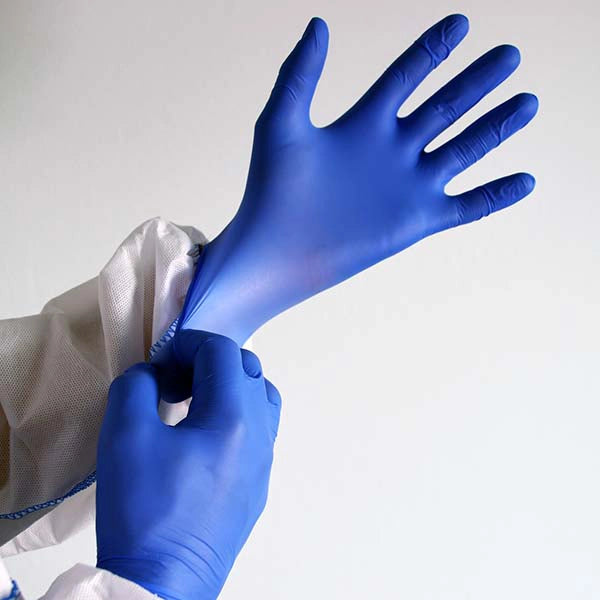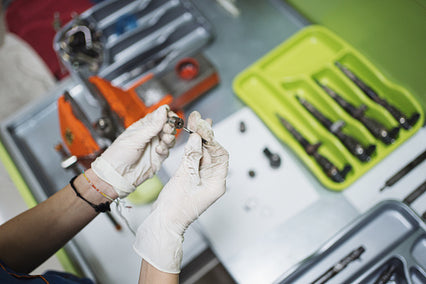The most characteristic feature of beekeepers is the protective gear they use for their work. After all, working with bees comes with the inherent risk of getting stung--and because beekeepers work with bees up close, there’s a greater risk of disrupting the bees and making them more prone to stinging.
So before you get busy with the hive, it helps to don a good pair of beekeeping gloves.
Here’s a look at why you should make the switch to disposable beekeeping gloves and how to choose the perfect disposable glove to keep you and the bees happy.
Can Bees Sting Through Bee Gloves?
Yes, bees can sting through bee gloves, especially if the gloves are made of thinner materials like nitrile. Thicker gloves, such as those made from leather or goatskin, provide better protection against stings.
However, even with thicker gloves, it’s possible for a bee’s stinger to penetrate if enough pressure is applied. Proper fitting gloves and careful handling of bees can minimize the risk of stings.
What are Beekeeping Gloves?
Beekeeping gloves are one of the most common items of personal protective equipment for beekeepers. They’re often made of leather, though nitrile gloves are an increasingly popular alternative.
What many beginner beekeepers don’t realize is that sting protection is actually the least of your concerns when buying beekeeping gloves. The reality is that you will get stung. That’s why a thick glove is actually the wrong choice for beekeeping gloves.
What Are The Beekeeping Glove Material Options?
Beekeeping gloves are made from various materials, each offering different levels of protection, flexibility, and comfort. Understanding these options can help you choose the best gloves for your needs.
Leather
Leather gloves are the most common choice for beekeepers. They provide excellent protection against stings and are highly durable. However, they can be stiff, reducing dexterity. Over time, leather gloves can become more flexible and comfortable with regular use.
Nitrile
Nitrile gloves are a popular choice for beekeepers who need a higher degree of dexterity. These gloves are thin and lightweight, allowing for more precise movements. While they offer less protection against stings than leather, they are more resistant to chemicals and can be used in various conditions.
Rubber
Rubber gloves provide good protection against stings and are resistant to chemicals and water. However, they can be less breathable and may cause your hands to sweat during extended use. They are often used in combination with other types of gloves for added protection.
Why Nitrile Gloves are the Best Gloves for Handling Bees
While it may seem counterintuitive, thin but durable gloves are actually the superior choice as beekeeping gloves.
The sole benefit of thick leather gloves is that you can’t feel the bees. But because you can’t feel them, you upset them even more during each weekly inspection. Thin gloves dramatically increase your sensitivity, dexterity, and your grip.
Granted, bees will still get agitated if you accidentally squash some of their siblings. But because you’ll be able to feel the bees, it will be much easier to avoid squashing bees through clumsiness. In other words, thin gloves enable gentler beekeeping, which makes for happier bees and a better experience for everyone.
When you reach for a thin glove, you should always reach for nitrile. Nitrile has remarkable tensile strength of 200 to 3,500 PSI (especially compared to the 18 MPa minimum for latex gloves). This gives you the best protection while still preserving tactile sensitivity in your hands. That way, you’ll be able to feel what you’re doing, but you’ll have the peace of mind you need to conduct your inspection without missing a beat.
Why Choose Disposable Nitrile Gloves?
Disposable nitrile gloves are a superior choice for beekeeping compared to reusable gloves. Despite generating more waste, they offer several key benefits:
Enhanced Sanitation
Switching to a new pair of disposable gloves for each colony inspection eliminates the risk of cross-contamination. This practice is crucial for maintaining the cleanliness and health of your bees, as it prevents the transfer of potential pathogens between hives.
Chemical Resistance
Nitrile gloves are highly resistant to chemicals, making them ideal for beekeepers who use various substances during hive maintenance. This resistance ensures that the gloves remain intact and protective when exposed to bee repellents, disinfectants, and other chemicals, ensuring safety and effectiveness.
Superior Dexterity and Sensitivity
Nitrile gloves provide excellent dexterity and sensitivity, allowing beekeepers to perform delicate tasks with ease. Their snug fit and thin material enable better control and precision when handling bees and equipment, enhancing the overall beekeeping experience.
How To Clean Beekeeping Gloves
Cleaning your beekeeping gloves is vital for hygiene, glove longevity, and safety. Here’s a quick guide:
First, remove debris by brushing off dirt and residue with a soft brush and rinsing with lukewarm water. Next, soak the gloves in a mild detergent solution for 15-20 minutes and gently scrub them with a soft brush. After scrubbing, rinse the gloves thoroughly with clean water. Optionally, you can disinfect the gloves by briefly soaking them in a weak bleach solution and then rinsing again.
Once cleaned, allow the gloves to air dry completely by hanging them up or laying them flat, ensuring they are out of direct sunlight to prevent material degradation. If your gloves are made of leather, apply a leather conditioner to keep them supple and prevent cracking.
Regular cleaning ensures your gloves remain effective and safe for beekeeping.
How Should Beekeeping Gloves Fit?
The fit of beekeeping gloves is crucial for both protection and comfort. Properly fitting gloves ensure that you can handle your bees and equipment safely and effectively. Here’s what to consider for the best fit:
• Snug But Not Tight: Beekeeping gloves should fit snugly on your hands without being overly tight. A snug fit ensures that the gloves stay in place while you work and provide the necessary protection. However, if the gloves are too tight, they can restrict movement and reduce blood circulation, leading to discomfort and fatigue.
• Full Coverage: Gloves should provide full coverage of your hands and wrists. The cuffs should be long enough to tuck under your beekeeping suit or jacket to prevent any gaps where bees might enter. Elastic or adjustable cuffs are ideal for ensuring a secure fit around your wrists.
• Dexterity and Flexibility: While protection is a priority, your gloves should also allow for adequate dexterity and flexibility. You need to be able to perform tasks such as handling frames, using tools, and gently manipulating bees without feeling restricted. Thinner gloves, like nitrile or goatskin, often offer better dexterity compared to thicker leather gloves.
• Comfort and Breathability: Comfort is essential, especially during long inspections or on hot days. Look for gloves that offer good breathability to prevent your hands from becoming too sweaty. Some gloves have ventilated areas or are made from materials that allow better air circulation.
• Testing the Fit: Before purchasing, try on different sizes and types of gloves to see which ones feel best. Make sure you can move your fingers freely and that there is no pinching or excessive looseness. Performing a few beekeeping tasks with the gloves on can help you assess their suitability.
Properly fitting beekeeping gloves are essential for both protection and functionality. They should be snug but not tight, provide full coverage, allow for good dexterity, and be comfortable to wear. Testing different gloves to find the right fit can enhance your beekeeping experience and ensure safety for both you and your bees.
How to Choose the Best Nitrile Disposable Gloves for Beekeeping
Overall, the best gloves for beekeeping will give you the sensitivity you need to keep your bees happy while also protecting your hands. That said, the key to fewer stings is to handle your bees gracefully, so don’t be afraid to reach for thinner gloves if they improve your experience with your bees.
Regardless of thickness, you should always reach for disposable nitrile. This is the strongest disposable material on the market, and single-use gloves avoid cross-contamination between colonies.
Shop for the Best Beekeeping Gloves
Looking for the best beekeeping gloves? We supply high-quality nitrile gloves to thousands of happy customers all across the U.S., from individuals to corporations to government agencies. Better still, our gloves are available at competitive prices that work for your budget, no matter what your budget may look like.
Ready for gloves that you and your bees will both enjoy? Check out our store and place your order today!
Best Gloves for Bee Keeping: Frequently Asked Question
Why don't beekeepers wear gloves?
Some beekeepers choose not to wear gloves to enhance their dexterity and sensitivity while handling bees. Bare hands allow for more precise movements and gentler handling, reducing the likelihood of injuring bees. Experienced beekeepers may also feel more confident in their ability to avoid getting stung and prefer the tactile feedback that gloves might inhibit. Additionally, bees can sometimes react more calmly to bare hands than gloved hands.
Can you wash bee gloves?
Yes, you can wash bee gloves, but the method depends on the material. Leather gloves should be cleaned gently with a mild detergent and water, then allowed to air dry. It’s advisable to apply a leather conditioner afterwards to keep them supple. Nitrile and rubber gloves can be washed with soap and water and then air dried. Always follow the manufacturer’s instructions for cleaning and maintaining your specific type of gloves to ensure their longevity and effectiveness.
How to get propolis off bee gloves?
To remove propolis from bee gloves, you can freeze them to make the propolis brittle and easier to scrape off with a blunt knife. Alternatively, apply rubbing alcohol to dissolve the propolis, or use vegetable oil to break down the sticky residue, then wash the gloves with mild detergent and water.






